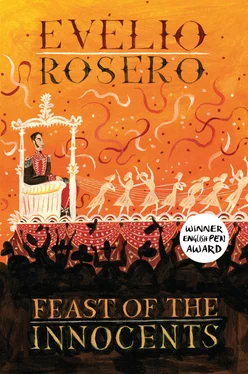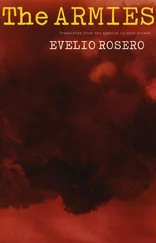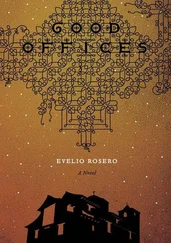“I know who’s in there.”
It was Matilde Pinzón. Alone. Without Primavera.
“I still don’t,” the doctor replied.
“Can’t you find her?” she asked. Her tongue glistened very red; she seemed about to burst out laughing.
“Find who?”
“Go home and wait for her,” Matilde said, pitying him, “I’ll look for her for you.”
The doctor did not know what to reply. Matilde Pinzón looked just like Primavera, but something repulsive set her apart, she was a sad woman, her expression a perpetual sneer. It felt inexplicable to him to be discovered in his ape costume by none other than Matilde Pinzón; how did she find out?
“Justo Pastor,” she went on, “do your bit and everything will work out, you and Primavera are the ideal couple, you understand each other, you hear one another without speaking.”
“Yes,” the doctor told her, he and Primavera understood each other so well that he was forever losing things and she found them all:
“Now, for example, I’m out looking for her.”
Matilde Pinzón started to laugh.
“Then first you’ll have to find her,” she said, “so she can tell you where she is. What a sense of humour you have, Justo Pastor, at least you still have that.”
And she moved off: an older man, who was not her husband, was waiting for her cagily, one arm open; the doctor recognized him, the fabulously wealthy but now decrepit Luisito Cetina, owner of the Luz del Pacífico hotel chain. He saw them slink furtively into the crowd. The sun grew stronger; the ape got further towards the edge of the avenue, not just pushing, but pushing people right over, and no-one complained; it was the fiesta.
He did not want to find out what or who was parading, he wanted to lose himself as soon as possible; an orchestra was announced; he felt as though they had turned some incredibly powerful lights on the day, out of nowhere; the ear-splitting orchestra began to rock the pavement to its core, the crowd thundered applause, bodies swayed desperately to and fro as one, faces daubed with powder and paint rubbed up against one another, a surge of multicoloured skirts dazzled him, two girls who were dancing — streamers and sawdust like glue in their hair — kissed greedily, far gone, happy; he craned his hairy ape head into the cleavages of celebrating women, one or another hung on to his arm a few seconds, a drunk span around crazily on one leg and did not fall, the women seemed to want him to, but the drunk did not fall, he did not fall; a bald man rubbed his eyes, bawling that they had thrown flour and lemon juice at him, the tarmac smelled of urine, dung, he forced a way through and reached the side of the avenue and leaned out; a troupe of old people were dancing a waltz: seven or nine columns of geriatrics enduring the morning sun, daintily dancing the waltz played for them by the San Pablo band, made up of musicians older than the dancers themselves. The bodies, their outer trappings — he thought, feeling sorry for them — they do what they can manage for us, what they can manage, should I get drunk? They were all at least ninety years old, he reckoned, from the Don Ezekiel Home for the Elderly— according to the banner — and some of them pretty senile, more in the next world than this one, he thought, it’s well worth dying while dancing without knowing we just died. Pushed by the crowd, a girl squashed her face against the orangutan’s hairy chest, and flapped her arms in distress; the ape embraced her and let her go, as if moved to pity, with tender little taps on her cheeks: those nearest laughed; the old people’s strange waltz started to twirl right in front of him; he heard someone asking: “Are they really old folk, or are they wearing corpse masks?” And someone answered: “Of course they’re old folk, but they dance like children; they’re made of stern stuff.” And a woman’s voice: “There are real nuns parading too, three blocks from here, and real lunatics, a lot further behind, the mad from San Rafael, the genuine article.” Another voice chipped in: “They say that in the prisoners’ troupe, the prisoners dressed as prisoners are real prisoners, and they swore to go back to jail when the carnival’s over.” “If I was a prisoner, I wouldn’t go back,” somebody said, and someone else: “I would, your word is your word, and your word is sacred.”
At that point Doctor Justo Pastor Proceso López did not know which he would prefer, to find Bolívar’s carriage or to find Primavera in the crowd. Primavera would be best, he thought, to give her a fright, to cover her eyes with his great mitts and ask, throatily: “Guess who?” Frighten her in order to kiss her, or the other way around, he thought.
One of the ancient couples waltzing, she and he exactly alike, siblings in decrepitude, saintly smiles on toothless mouths, turning very slowly, came to an ill-timed halt beside him. In the old lady’s eyes was the look of someone about to pass out. He heard her say: “I can’t go on,” and her partner: “We’ll have a rest,” and she replied: “It’s not the dance I can’t go on with, it’s life,” and they separated themselves from the procession, hand in hand, heartbroken. No-one came to their aid. The doctor took off the great ape head: “Go and get some fresh air and no more dancing,” he ordered, like the doctor he was. Someone offered them a bottle of aguardiente , which he turned down; he took the old people by the arm and led them to a nearby tent, where the different soloists and trios were taking turns to play. He sought, found and fought over two chairs for them. Just then, Pasto’s most glorious musicians greeted the audience from the stage: Maestro Nieto, on the requinto , and Chato Guerrero on guitar. They were announcing the already legendary “Viejo Dolor,” to be played as a foxtrot, which made the old lady swoon with emotion: “Don’t let me die without hearing it.” The public uttered cries of “ viva! ” for Maestro Nieto, famous not only for his “Viejo Dolor,” but the phrase he once used to describe his musical abilities: I can’t read a note, but nobody notices. The doctor listened to the opening cadenzas of the foxtrot for a magical minute and moved away. He had the ape head in his hands, undecided whether or not to put it back on: he was dripping with sweat; he decided to plunge into the broad current of the crowd and strike out in the opposite direction to the way the parade was going in order to finally encounter the floats, one by one. There, astonished, he heard a woman shouting, calling him by name. He froze. The shout came again, from a nearby balcony. He moved forward until he was underneath it, beside an unfamiliar house: the doorway teemed with bodies going in and coming out with considerable difficulty. In the middle of that balcony brimming with women, the pious Alcira Sarasti laughed and stretched her bare arms towards him:
“Come up, Doctor, what are you doing with that ape head? Come up and we’ll watch the floats from here.”
“I don’t think I can come up,” the doctor shouted. “There’s an absolute forest of people.”
And he put the big ape head on again — she recognized me, he thought, what if I bump into the widow? What’ll I do with two lovers at once?
“Then I’ll come down,” Alcira shouted, and disappeared from the balcony.
He waited for her a good long time, under a crushing sun, but she did not come. At one point he thought he saw her head float past on a sea of heads, going under and coming up again, and then he saw her no more: it was as if the crowd had swallowed her up. The sea of heads was crashing on the shore of the avenue; at last the first carnival float was seen approaching. He did not need to move: the entire mass of merrymakers, like a river, dragged him along to the foot of the float. And still he did not manage to make out the theme, the spirit of the float; he was at its feet, but he could not guess what it was about, it presented such a vast spectacle to his eyes, an edifice; to take it on board in its full enormity you had to be on the balcony where Sarasti had shouted from. And he read the notice on it, a banner suspended between the feet of an unidentifiable animal: WHEN THE POPPIES FLOWER . It was not his Bolívar float. In a sort of royal box, stuck halfway up, he saw four girls dancing: the sequins on their miniscule costumes flashed in the sun; clouds of talcum powder swirled out around their ankles, streamers flew through the air; “It’s the House of the Sun,” the crowd guessed, and the titanic animal seemed to agree — half fish, half lion; huge seahorses swam about, a resounding jeer was heard on all sides, the doctor wondered who the crowd was laughing at — is it me? — and he looked himself up and down: he was an ape, white with powder, but no-one seemed to see him. He continued to overhear absurd comments: “My bitch and my grandma are going there,” “They’re the governor’s canaries,” and he raised his eyes higher, as the orchestra exploded over his head; then he discovered the queen of the carnival, beauty of beauties, almost naked, jiggling about at the very top of the float, shimmying on a narrow beam; she held a small sign against the triangle of her crotch which read: TROY WAS HERE .
Читать дальше












